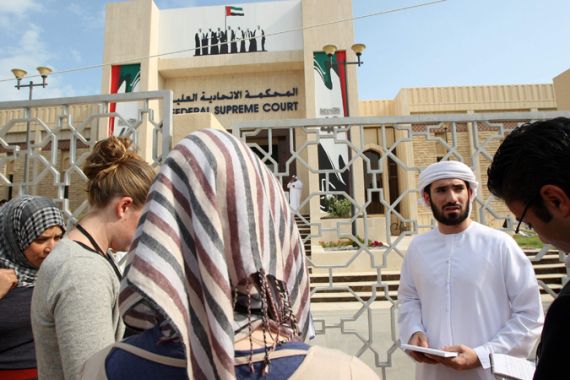UAE pardons jailed activists
Emirates pardons five activists convicted previous day for insulting country’s leadership, group’s lawyer says.

 |
| Blogger Ahmed Mansoor was detained with four other activists for ‘insulting the UAE’s leadership’ [Al Jazeera] |
Five United Arab Emirates political activists received presidential pardons and were released after eight months in prison, just a day after they were convicted of anti-state crimes.
The activists, including a prominent blogger and an economics professor, were convicted on Sunday of insulting the UAE’s top leadership, endangering national security and inciting people to protest at time when uprisings against authoritarian rulers raged across the Middle East.
The UAE has not been hit by the Arab Spring unrest that has spread across much of the rest of the Middle East, including neighbouring Bahrain.
Authorities moved aggressively against any signs of dissent that could pose a challenge to the tight political controls in the country.
Blogger Ahmed Mansoor was sentenced to three years in prison. The other four activists, including a professor who has lectured at Paris’ Sorbonne university in Abu Dhabi, Nasser bin Gaith, received two-year jail terms on Sunday in the Gulf country’s security court in the capital Abu Dhabi.
On Monday, they were pardoned and released.
“I feel happy because I am back with my family, but I also feel ashamed and have deep sorrow for my country,” bin Gaith told The Associated Press news agency in an interview after his release.
“All I can say is that it’s a sad moment for our homeland, a beginning of a police state that has tarnished the image of the UAE forever,” bin Gaith said.
The office of Sheikh Khalifa bin Zayed Al Nayhan, the president, did not offer any immediate comment.
The defendants were arrested after signing an online petition demanding political reforms, including free elections for parliament.
The UAE’s current parliament serves as an advisory body, and its 40 members are either directly appointed by the government or elected by a hand-picked set of voters.
The men refused to attend a hearing in October, and earlier this month started a hunger strike after they “lost all hope of a fair trial”.
The UAE has been sharply criticised over the trial by human rights groups, with Human Rights Watch saying it was “grossly unfair” earlier this month.
Samer Muscati, a researcher for the group, called the sentences “disappointing” in an interview with Al Jazeera on Sunday.